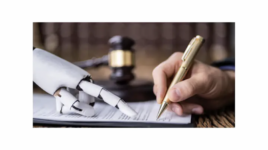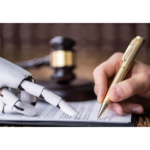“Robot Lawyer” Faces First Lawsuit

The creator of chatbot software dubbed “Robot Lawyer” which supplies legal information and documents purportedly tailored to the needs of clients is being sued for providing “substandard” and “poor legal advice”.
United States-based legal services company, DoNotPay, was established in 2015 and initially marketed its software as a way to help people beat parking tickets.
Since that time, it has expanded to provide over 100 services, including divorce agreements, property disputes and accessing government benefits.
The lawsuit is being brought by Jonathan Firidian, who says he purchased the service on the understanding he would receive materials and advice “fit for use from a lawyer that was competent to provide them”.
He claims the service provides no such thing and is in fact “unlawful”. According to his claim:
“Unfortunately for its customers, DoNotPay is not actually a robot, a lawyer, nor a law firm. DoNotPay does not have a law degree, is not barred in any jurisdiction, and is not supervised by any lawyer”.
“DoNotPay is merely a website with a repository of—unfortunately, substandard— legal documents that at best fills in a legal adlib based on information input by customers.”
“This is precisely why the practice of law is regulated in every state in the nation. Individuals seeking legal services most often do not fully understand the law or the implications of the legal documents or processes that they are looking to DoNotPay for help with.”
Non-lawyers providing legal services in Australia
While the case is unfolding in the United States, cases have recently been reported that actual humans without practising certificates have been providing legal services right here in Australia – including courtroom defence work in criminal law cases.
Two humans have recently been caught practising law without the qualifications to do so, and it’s a very serious matter, because lawyers spend many years studying the law and legal process to earn their practising certificates, and having unqualified people provide legal services have seriously adverse consequences on their lives, and result in mistrust of the legal profession and the justice system.
One man purporting to be a lawyer was stopped in the middle of a defended criminal law hearing at the Downing Centre Local Court after information was received suggesting that the man presenting himself as a practicing lawyer when he did not have a licence to do so. The New South Wales regulatory body for legal practitioners is currently investigating the situation.
Another man has recently also been charged by the Law Society of NSW with five counts of being an unqualified person advertising that he could engage in legal practice and one count of engaging in legal practice when he was not qualified.
The same man is now under investigation in Queensland – records and statements appear to indicate he is not qualified to practise in NSW. He is also reportedly under investigation in South Australia, Victoria and the United States.
How do I know someone is a ‘real’ lawyer?
In New South Wales, lawyers are governed by the Legal Profession Uniform Law 2014 which, together with its regulations, set out the rules relating to admission as a lawyer, practising certificate requirements, the operation of law practices, requirements regarding trust funds, costs billing, advertising and so on.
In addition to this, the Legal Profession Uniform Australian Solicitors’ Conduct Rules 2014 (or the ‘Conduct Rules’) impose strict ethical obligations on lawyers.
If these rules and regulations are breached there are serious consequences. This is similar to the regime for practicing solicitors in all other states and territories.
In the US though, practicing without a licence is also a serious matter. It has resulted in civil action against the World’s first AI powered lawyer, which has certainly put the “bright future” of the invention into question.
Concerns about technology as a substitute for humans in law
“Robot Lawyer” was intially touted as being able to provide greater access to justice, which in America is not always affordable, particularly for minor offences such as parking tickets, and there was high hope that it would find a place within the profession.
It was used to contest its first cases in court earlier this year, which was set to be a test of how competently it would operate in a courtroom by listening to the arguments and collating a response for the defendant from a database of legislation and legal precedents, communicated to the defendant via headphones.
The basic operational premise was that the defendant would actually represent themselves in the courtroom, relying on the bot for advice about what to say.
These first court cases were also set to be a test of any resistance to the bot being used in a courtroom – to date it is not barred in any jurisdiction in the US.
The current case, which is being heard in San Francisco’s Superior Court, and in the state of California, will determine not just whether the plaintiff should be able to obtain compensation for a poor service, but also whether the service amounts to practising law without a licence.
Legal service using software in Australia
A similar service opened in the Northern Territory in 2017, assisting clients with many issues relating to estate planning such as will, with business structuring including discretionary “family” trust deeds, and with company incorporation and partnership agreements.
There are none operating in New South Wales.
Concerns about software giving legal advice
There have been concerns for years that AI does not have the capacity to “think like a human” in particular, be empathetic, or “think outside the box”, and make judgements based on a range of intangible factors rather than just data – which are vital to being an effective lawyer.
Having said, as AI technology evolves and improves, it may well form an important role in providing some aspects of legal services in the future.
Looking to engage a lawyer?
If you are looking to ensure the person you are hiring as your lawyer actually has a practising certificate in our state, you can search the law society’s register of solicitors.
Lawyers who hold practicing certificates outside New South Wales but within Australia are permitted to practice in any state or territory, but their details are not available on this database as it is specifically for New South Wales only.







